Research projects and supervisors
The biggest considerations when choosing to study for an MSc, PhD or MPhil are the project and supervisor. You're very welcome to discuss research projects with potential supervisors. The most successful are defined by a distinct strength and knowledge of a subject area. The list of potential projects is indicative – please contact members of staff directly for more information.
Full staff list
Further contact details for Biomedical and Life Sciences staff can be found below.
Our staff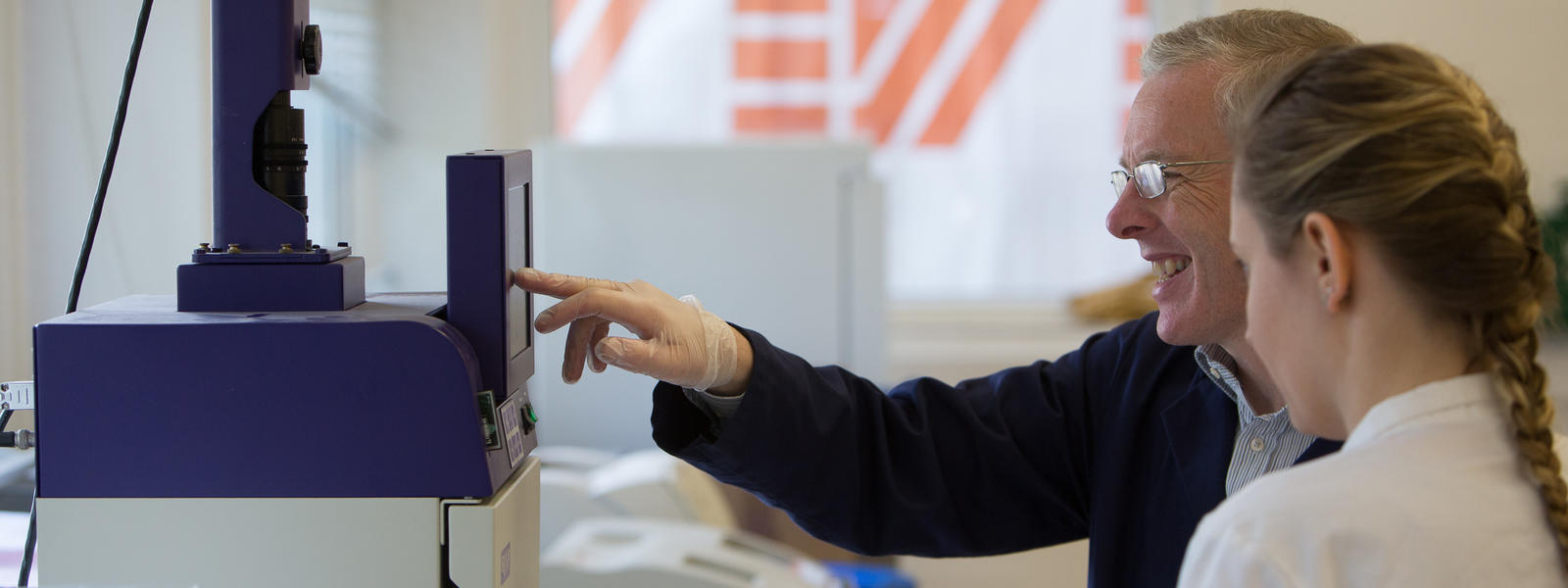
Loading People
We couldn't find anybody who matched your criteria

Professor Sarah Allinson
My lab works within the theme of genome stability, with two main points of focus: (1) molecular mechanisms of DNA repair in unicellular eukaryotic parasites and (2) the DNA damage response in skin cells in response to UV and other damaging agents.
I am able to offer projects in either of these two areas and would welcome applications from prospective PhD and MSc students. Please contact me for further details.

Dr Alexandre Benedetto
I can generally welcome PhD and MSc by Research students interested in studying:
(1) the spatiotemporal dynamics of gut host-microbiota interactions in C. elegans,
(2) organismal death in C. elegans
(3) whole-brain GCaMP imaging in C. elegans
(4) the role of intercellular variability in cancer progression (in collaboration with Dr Richard Mort).
(5) cell bioenergetics in cancer and ageing (collaborations with Dr Richard Mort and Dr Shefeeq Theparambil)
(5) epithelium tissue/organoid-on-chip (collaboration with Dr Caroline Weight)
Key areas for research projects in 2025-2026:
(1) Investigating brain activity at death in C. elegans (collaboration with HHMI Janelia Farms, expect short/longer-term visits there).
(2) A fluorescent microbiota model for live monitoring of gut-microbe interactions during C. elegans ageing (collaboration with CAU Kiele in Germany, expect short visits there).
(3) Probiotics to improve animal thermotolerance (collaboration with QUB and Glasgow U, expect short visits there).
For initial enquiries, students should email me at: a.benedetto@lancaster.ac.uk, referring to a specific MRes or PhD project flavor in the email subject. CVs welcome.

Dr Susan Broughton
I would be happy to hear from prospective students at PhD or MSc by Research level to discuss projects on the role of insulin/IGF-like signalling in brain ageing in Drosophila melanogaster.

Dr David Clancy
I have projects available for self-funding PhD and Masters by Research candidates.
Age is the major risk factor for the major causes of death in humans. Therefore I investigate the basic biology and the genetics of ageing with the aim of delaying the onset of ageing-related changes so that healthy lifespan is extended. To discover and test potential drug targets and therapies I use the model organism Drosophila. I welcome enquiries from students interested in this rapidly moving and very exciting area.
I also have a bioinformatics MRes project to investigate nuclear-mitochondrial genetic interaction effects on human health using UKBiobank data.
I have a PhD or MRes project to characterize small-molecule antimicrobials and antivirals (including SARS CoV2) derived from a novel source. We are close to patenting this.

Dr Nikki Copeland
I would be happy to hear from prospective students at MSc by Research level or PhD level to discuss projects on mammalian DNA replication, DNA replication stress and cancer biology.

Dr Neil Dawson
I am able to supervise students undertaking both Masters and PhD research projects in the fields of translational neuroscience, drug discovery and behavioural neuroscience.
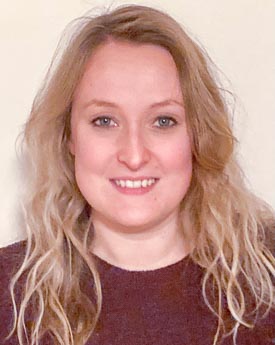
Dr Caroline Dewar
I would be happy to hear from prospective students at PhD or MSc by Research level to discuss projects in trypanosome mitochondrial biology. Please contact me for further details: c.dewar1@lancaster.ac.uk.
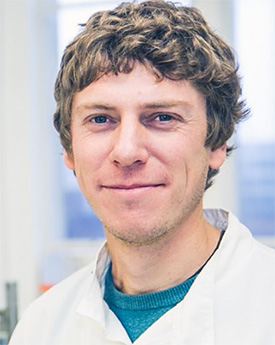
Dr Andrew Fielding
I am always very happy to discuss MSc by Research and PhD projects, in the field of cancer cell biology.
We are particularly interested in using novel therapies to specifically inhibit the growth of aggressive cancer types, such as triple-negative breast cancer and metastatic uveal melanoma.
We are also interested in cell-cycle and cell migration defects in cancer.
Can currently offer projects in several areas including:
1. Validation of novel cancer therapies in aggressive cancers.
2. Cell cycle defects in cancer
3. Understanding and targeting centrosome amplification in cancer.
4. The interplay between DNA damage, the cell cycle and centrosome amplification.
Projects typically involve multiple techniques, including cell culture, fixed and live cell microscopy, cell growth assays and flow cytometry. Image analysis of high-content live cell imaging data is another technique used in some projects.

Dr Aikaterini Gatsiou
Our lab is dedicated to nurturing future leaders in research, and we are excited to announce that we are now accepting PhD applications. If you are passionate about cutting-edge RNA science and eager to make a difference, we want to hear from you.

Dr Cheryl Hawkes
I am happy to discuss possible MSc and PhD projects with students who are interested in brain development and ageing, factors that influence cerebrovascular health and Alzheimer's disease.
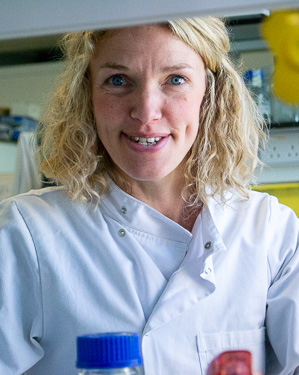
Dr Lucy Jackson-Jones
I would be happy to hear from prospective students at MSc by Research or PhD level to discuss supervision of projects in the fields of Immunology and Inflammation research. My group works on fat associated lymphoid clusters and investigates how such novel immune structures co ordinate body cavity immune responses during allergy, infection and disease. Projects include 1. Investigations into the role of locally produced chemokines in mesothelioma like inflammation in the pleural space 2. Understanding how macrophages recognise oxidised phospholipids 3. Investigating the role of FALCs in activation of a local immune response against multi-cellular parasites such as Schistosoma mansoni and Trypanosoma brucei. 4. Understanding how antibodies control macrophage lipid usage during inflammation.

Professor Bob Lauder
1. Development of methods for glycosaminoglycan analysis,
2. Glycosaminoglycans as markers of pathology,
3. Role of bacterial toxins in sudden death.
I welcome enquires from prospective PhD students interested in working in these, and related, areas.
2. Glycosaminoglycans as markers of pathology,
3. Role of bacterial toxins in sudden death.
I welcome enquires from prospective PhD students interested in working in these, and related, areas.

Professor Paul McKean
I can offer PhD and MSc by research projects in the following areas of research: (1) The developmental cell biology of African trypanosomes. (2) Trypanosomes as models to study proteins implicated in human ciliary diseases. Please contact me for further details.
(No funded positions are currently available).

Dr Stefanie Menzies
Antibody discovery

Dr Richard Mort
I can offer PhD and MSc by research projects on either melanocytes and melanoma or cell/tissue biosensors. Please contact me for further details.
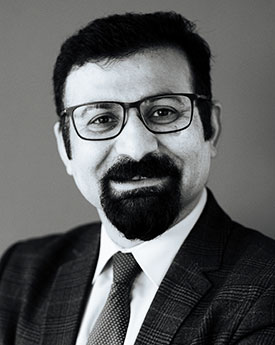
Professor Muhammad Munir
The following projects are on offer:
1. Epigenetic Regulation of Viruses.
2. Roles of Interferon Regulated Genes in the Pathobiology of Influenza Virus.
3. Proteomic Approaches in Understanding Viral Antagonism of Host Responses

Dr Edward Parkin
Various Masters by Research and PhD projects are available on a self-funded or part funded basis including:
Developing neuron specific inducible cell expression systems and potential gene therapies for the study and treatment/prevention of Alzheimer’s disease,
elucidating the role of soluble amyloid precursor protein fragments in Alzheimer’s disease,
investigating the role of neurexin proteolysis in Alzheimer’s disease,
and the role of Jagged1 on prostate cancer metastasis.

Professor Jackie Parry
I am willing to supervise PhD and MSc by Research students on projects examining the effect Cannabidiol (CBD) and bacterial acyl homoserine lactones on protists.

Dr Rachael Rigby
Projects available in my lab include investigating the role of intestinal microbiota, and associated signaling pathways, in diseases such as cancer, inflammatory bowel disease and neurological conditions. I'm also interested in how microbes train the immune response to protect or predispose individuals to disease and influence treatments or therapies, including recovery from surgery and immunotherapy. Please contact me on rachael.rigby@lancaster.ac.uk to discuss a specific area of study for PhD or Master by Research projects.

Dr Nick Robinson
PhD positions and MSc Research posts are available in the Robinson laboratory in the following areas:
(i) maintenance of genomic stability (DNA replication and repair mechanism)
(ii) protein homeostasis (ubiquitin-like modifications and protein turnover).
The laboratory specialises in the use of model archaeal systems to study these fundamental cellular processes which underpin a variety of disease states including cancer and neurodegeneration.
Please email me for further information regarding funding and project specifics.
http://www.lancaster.ac.uk/fhm/about-us/people/nicholas-robinson

Dr Leonie Unterholzner
My laboratory works on the innate immune system and host-pathogen interactions. We are particularly interested in the molecular mechanisms of how cells detect DNA in the cytosol, and how nuclear DNA damage and replication stress act as danger signal for the immune system.
Some examples of potential Masters by Research projects are:
1. How do poxviruses evade detection by the innate immune system?
2. How is intracellular DNA detected as "stranger" and "danger" signal?
3. Has our innate immune system evolved from ancient anti-viral defences in Archaea? (joint project with Nick Robinson)
4. Does oncogene-induced replication stress drive inflammation in cancer?
5. How are DNA sensing factors activated in autoinflammatory conditions?

Professor Mick Urbaniak
My laboratory is also able to offer self-funded PhD and MRes projects to students interested in exploring the biology of the parasites Trypanosoma brucei and Leishmania species, which are the causative agents of both human and animal diseases in many developing countries. We can offer projects studying i. how the parasites sense and adapt to their host environment, ii. regulation of the cell division cycle, and iii. the link between parasite infection and behavioral changes in the host. Please email m.urbaniak@lancaster.ac.uk for further details.

Dr John Worthington
I am happy to accept proposals on projects in the area of intestinal inflammation focussing on parasitology, immunology and endocrinology.

Dr Karen Wright
Cannabinoid receptor signalling bias in ex vivo intestinal organoids.
Importance of physiological levels of oxygen and energy sources in validating GI epithelial cell models of inflammation and cancer.
Contribution of enteroendocrine cells to cannabinoid modulation of intestinal barrier permeability function (with John Worthington).
Ethical considerations of human organoid donation and research (with Laura Machin and John Appleby).
Impact of cannabinoids on free living ciliates (with Jackie Parry).
Students can also apply for MSc by research for the last three projects.

